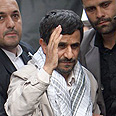
Iranian President Ahmadinejad
צילום: AP
Report warns of covert Iranian bid to expand nuke program
Islamic Republic secretly tested more uranium enrichment methods, according to intelligence assessment obtained by AP; American official says effort may eventually be used to produce nuclear weapons
Iran has recently tested ways of recovering highly enriched uranium from waste reactor fuel in a covert bid to expand its nuclear program, according to an intelligence assessment made available to The Associated Press.
The intelligence, provided by a member of the 145-nation International Atomic Energy Agency, also says a report will soon be submitted to the Iranian leadership for a decision on whether to go ahead with the project.
The alleged tests loosely replicate Saddam Hussein's attempts to build the bomb nearly two decades ago. But experts question the conclusion by those providing the intelligence that Tehran, too, is trying to reprocess the fuel to make a nuclear weapon.
They note that the spent fuel at issue as the source of the enriched uranium is not enough to yield the approximately 30 kilograms of weapons-grade material needed for one simple warhead.
Still, they say that the alleged experiment appears plausible – if not as a fast track to weapons capability then as an incremental step that could move it further along that path.
The laboratories and the Tehran Nuclear Research Center, where the research reactor is located, have figured in numerous experiments that have raised the suspicion level about Iran, including plutonium separation attempts that Iran owned up to only after it was pressed by IAEA experts probing its nuclear past.
'Iran trying to get nose in tent'
If the information is accurate then Iran is "trying to get their nose in the tent" of reprocessing material potentially suitable for a warhead, said David Albright, whose Washington-based Institute for Science and International Security tracks suspect secret proliferators.
"On the surface it may have nothing to do with making a bomb, but in the end that's what it could be about."
For the US and others, Iran is a top proliferation concern because of suspicions it had at least drafted concepts of nuclear weapons programs during nearly two decades of covert atomic activities discovered six years ago.
Tehran denies past, present or future nuclear arms ambitions. But it is stonewalling IAEA attempts to probe alleged past weapons program experiments and continues to expand its uranium enrichment program.
Iran has shrugged off UN Security Council sanctions prompted by fears that through enrichment, it may want to produce the fissile core of nuclear warheads instead of the fuel the Islamic Republic says it needs for a future civilian program. Those fears are stoked by Iran's refusal to consider foreign nuclear fuel deliveries.
"It's the idea that Iran wants to slowly develop nuclear weapons capability under the tent and it does it slowly so that people will accept it," said Albright. "It's (a matter of) keeping your head down, moving slowly and deliberately and winning at each step."










